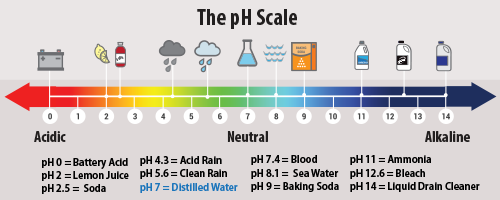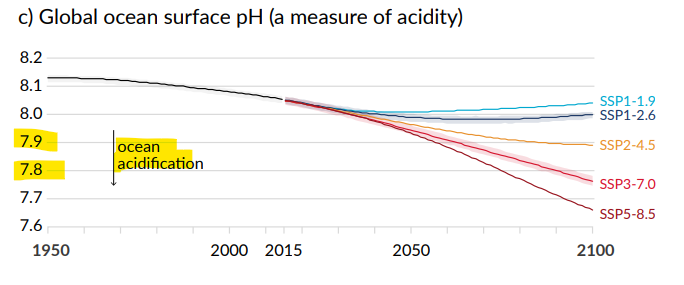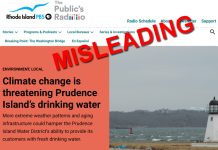In its Sixth Assessment Report (AR6) the Intergovernmental Panel on Climate Change (IPCC) claims humans are causing the world’s oceans to turn acidic, threatening all sea life. This is false. The world’s ocean are and will remain alkaline. Neither climate models nor hard data indicate otherwise.
Chapter One pg. 169 of the AR6 states,
“[i]ncreasing atmospheric carbon dioxide concentrations lead to increasing acidification of the ocean. Projections based on SRES scenarios give reductions in average global surface ocean pH of between 0.14 and 0.35 units over the 21st century, adding to the present decrease of 0.1 units since preindustrial times.”
The numbers cited in this statement may or may not reflect reality. It’s hard to know since the purported decline is based not on an actual measurement of average ocean alkalinity, but rather is conjecture based on computer model simulations. Regardless, the claim that a modest decline in pH is “increasing acidification of the ocean,” is false. To increase acidification, oceans must first be acidic. They are not.
As seen in figure 1, At any pH level above 7 water is alkaline, not acidic. Water is acidic if, and only if, its pH is below 7. A pH of exactly 7 is neutral. As explained in Climate at a Glance: Ocean Acidification,
“The pH of the oceans average 8.1, and range from 7.8 to 8.5. By comparison, rainwater is “acidic,” averaging 5.6. Since the beginning of the Industrial Revolution in 1850, according to models, the pH of surface ocean waters has fallen by merely 0.1 pH units.”

Contrary to the IPCC’s misleading statement, reducing ocean water’s alkalinity does not make them more acidic, it makes them less alkaline. They aren’t the same thing. Even a doubling of carbon dioxide will not make ocean water fall below a pH of 7, and thus acidic.
To stoke panic about the health of the oceans, the IPCC proceeds from misleading statements about ocean acidity to outright lying about it in a graphic on page 29 of its Summary for Policy Makers (SPM) seen in figure 2. This graphic claims acidification begins at pH 7.9. This is absolutely false.

Regionally and locally, ocean pH levels naturally fluctuate through churning by currents and wave action between 8.5 and 7.8 pH, seasonally and even daily sometimes. But the absolute scientific standard for being considered acidic is for water to fall below 7.0 pH, not 7.9 as the SPM graphic portrays. Even under the highest emission scenarios, the IPCC’s own misleading graphic does not indicate oceans’ average pH will fall below 7.6 by 2100, much less to 6.9.
The oceans aren’t acidic, much less becoming “more acidic.”
Politicians routinely lie, thus, the fact that politicians who shaped and had to sign off on the SPM lied should not be surprising. The fact that scientists allowed them to get away with it, by contrast, should shock the conscience. It should also undermine any confidence anyone would have in IPCC AR6.


















